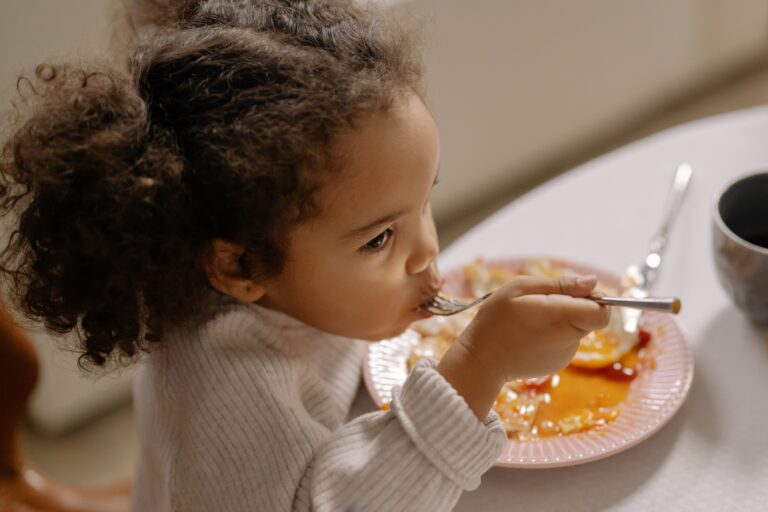Children are our little miracles. They are born into this world complete, embodied, intuitive, curious, and bursting with love. They aren’t using food tracking apps to teach them how to eat, they smile and are happy without a second thought about what they are wearing or if people will judge them for what they weigh.
Yet, somewhere along the way, they begin to doubt their beauty, their worth, feel they are not good enough, skinny enough, a diet mentality manifests, and their inner world convinces them that losing weight is the road to ultimate happiness, safety, and success.
In fact, a 2016 study by the Professional Association for Childcare and Early Years (PACEY) identified that:
- 24% childcare professionals have seen body confidence issues in children aged 3-5 years old
- 47% of child carers have witnessed anxieties about body image in children aged 6-10 years old
- 71% believe children are becoming anxious about their bodies at a younger age
By the age of 5, many children have already pretty much begun to make up their minds (and even hold strong views) about how bodies should look, some 4 year olds are even aware of strategies as to how to lose weight.

This just shows children are hyper-aware of the thin and beautiful ideals that our society values from images on TV, images in storybooks, and how important it is that YOU get the help YOU need with your own food and body image struggles if you want to have the best chances that your struggles are not unintentionally passed along to your kids.
Young children are often influenced the most by their mothers’ weight-loss attempts and dieting behaviors, and children of dieting mothers are more likely to experience body dissatisfaction, chronic dieting, and disordered eating as they grow.
Regardless of the amount of love a parent can have for their child, when he or she is stuck in their own issues surround food and body, they end up doing a poor job of protecting their daughters and sons from the scourge of disordered eating and poor body image and they are often the ones who perpetuate these harmful, life-altering messages for their beloved children.
I usually ask my clients, “Do you remember being taught your ABC’s?”
Of course they all say “No.”
I follow with, “But you eventually learned your ABC’s, yes? You eventually learned your first language. If your mom was diet obsessed and struggled with her own body image, whether you remember her words or not, you learned that diet language somewhere along the way too”.
The biggest commonality amongst one’s eating history we hear from clients is regarding the impact their mom had on their relationship with food. “I was put on a diet before the age of 10”, “My mom was a dieter”, or “My mom always struggled with her weight (and still does)”. Unfortunately, many of our clients never had the chance to experience a healthy relationship with food due to such an early exposure to the diet mentality.
Please know we are not pointing fingers at moms and playing the blame game, rather we are simply bringing awareness to what impacts a child’s view on food, diet, and their body image.
There is usually plenty of validation of why mom struggled herself. Perhaps she grew up in an era where she too was expected to be thin. Perhaps she inherited food and body struggles from her mom. Maybe mom’s parents were unable to give her the emotional skills she needed to be emotionally resilient. Many cultures around the world promote the importance of being thin, advocating that women are to be thin if they want to find a man, if they want to get married, that having any fat on their body was unacceptable, etcetera, making it harder to break the generational curse surrounding food and body struggles.
The good news is, the more you work hard to redefine eating and cultivate a healthy relationship with food for yourself, not only will you bring awareness to what is keeping YOU stuck in the diet mentality, but awareness about some of your verbal and non-verbal actions that may be infiltrating your child’s inner universe about their own bodies.
Awareness is 50% of the solution. So let’s take a closer look at common verbal and non-verbal behaviors that could have a negative impact for both yourself, AND your little one.

Influential Non-Verbal Behaviors
- Cooking a meal for your family but eat something separately (most often)
- Not participating in certain family events or functions to avoid eating
- Never eating certain foods in front of your kids.
- Chronically skipping meals with your children or the family
Influential Verbal-Behaviors
- Negative self-talk about your own body, especially in front of kids (ex: using phrases like, “I look horrible in this”, “I feel fat”, “Once I lose this weight, I’ll feel so much better”, etc.)
- Negative comments about OTHER people’s bodies. “I can’t believe ____has gained so much weight!”
- Negative discussions about your food, (ex: “This food is so bad for me”, “If I eat this, it will go straight to my hips”, “I’ve been so bad today – I better just eat a salad for dinner”, etc.)
- Negative comments from a parent such as “look at your little belly!” can have a long-lasting impact.
- “You are such a good eater!” may send the message they are morally good if they eat healthy foods and morally bad if they eat something less nutritious.
- “Clean your plate! We don’t waste food in this house” can condition overeating and interrupt their own needs to tune into their own body about how much food they feel they want and need.
- “Eat your dinner or you don’t get dessert” translates “you must eat more than you need and I will reward you by giving you more to eat”
- “You are such a picky eater” may create selective eating behaviors and can become more intense when we beg, bribe, or threaten.
Researchers surveyed 581 parents of children ages 9 to 15 about the different kinds of “fat talk” they used around their kids and then collected data about their children’s weight and relationship with food. They found that 76 percent of the parents criticize their own bodies in front of their children and 51.5 percent talked more generally about the dangers of obesity, but that 43.6 percent talked about their children’s bodies, taking note of weight gain or commenting on “flabby arms,” for example. And this last group was the most likely to have kids who engaged in binge eating, secretive eating or other disordered behaviors, according to the results published in a 2018 issue of the International Journal of Eating Disorders.
You have the opportunity now to be part of the solution. Here’s how:
Put Yourself First and Get The Help YOU Need
The more conflicted and unhappy you feel around these issues, the more likely you are to pass those attitudes down to your son or daughter. If you are always dieting, your son or daughter will think constantly restricting food is the norm for adult life.
It’s OK to be in a hard place with your body. You don’t have to have all the answers. But if you want your kids to not have such a toxic relationship with carbs or sugar, then you need to work on your own relationship with it.
Asking yourself, “Is this advice or way of eating what I’d happily teach my kids?” If the answer is no, it might be time to reframe your health goals in a kinder, more body-positive light.
Studies on intuitive eating found that giving ourselves permission to eat any food resulted in a healthier, more varied diet overall, which is why Intuitive eating is a huge part of our curriculum with our clients in all of our online programs.
Choosing physical activities because you find them genuinely fun and joyful tends to result in more regular exercise in the long-term than forcing yourself to do punitive workouts in the name of weight loss. Don’t believe me? I challenge you to read Health at Every Size by Lindo Bacon.
Be as patient with yourself as you are with your child when he or she is mastering a new skill. I am sure you have many years of body bashing to unlearn, be compassionate with yourself and allow yourself time to learn and grow.
Ditch the Diet Talk
If you are always talking about your own fat thighs or cellulite or muffin top, what are the chances your daughter will escape the same nagging voice in her own head when she looks in the mirror? Chances are strong she will look like you when she grows up, and even if she doesn’t, the maternal voice is a powerful one. It will shape the rest of her life, so think before you speak about food and weight: is that how you want her to feel?
“The research tells us that what you say matters more than what you do,” said Kendrin Sonneville, Sc.D., R.D., an assistant professor of nutritional sciences at the University of Michigan School of Public Health, where she studies eating disorder prevention. In other words, even if you’re dieting or feeling bad about your body, you can insulate your children to a certain extent by making a concerted effort to have a different conversation with them. “Don’t talk about losing weight, don’t label foods as good or bad and do communicate to your children that their body weight is not their worth,” Dr. Sonneville advised. “The words you use really matter.”
Be Body Positive Inspiration
Teach your children that all bodies are good bodies. Going against valuing people for their appearance teaches your children to think about the non-physical characteristics that make people good.
You can make a point to show body diversity in the art, books and other media you bring into your home. Some good resources for young kids are Your Body is Brilliant: Body Respect for Children and Body Can books.
Even toddlers can start learning that bodies come in different shapes and sizes, all of them equally valuable. And as kids get older, you can start to point out when you encounter body shaming in their books or TV shows and encourage them to rewrite such stories.
Our children live in a very different world than we did when we were kids. The pressures we felt as kids is nothing compared to what they face today and what they will in the future. The fact that children are developing insecurities so young means they are ready to handle these discussions. Don’t be afraid to talk to them.
And it is our job, as parents, caretakers, and influencers, to mitigate this as much as possible.
It starts with protecting our own children from our very own deeply ingrained diet mentality. It starts with learning how to love and truly take care of yourself, healing your own relationship with food, and that we all are about so much more than the food we eat and the jean size we put on in the morning. So much more.
Did you benefit from this article? Share the love so others can benefit too and help culture to redefine eating and experience diet freedom!


